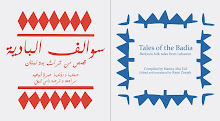A few days ago my friend and co-researcher Ann invited me to come and watch an impromptu performance of her dance group from the
Maqamat dance theater program. Ann is a talented dancer and a researcher on sustainability and an activist on Palestine, and she came from the US to join the Maqamat program. The performance was in the new Beirut Souks, in what is known as the Beirut Central District, and involve a series of short dance acts in different locations in the Souks. Ann had warned me that they had not sought permission, and I thought that this was an action by dance artists to reclaim the city center, also known as the Solidere area. There has been much written about Solidere and how it came to exist and the role of former prime minister Rafic Hariri (assassinated on February 14, 2005) and his private contracting companies in laying hand on Beirut's city center. One of the best scholarly articles on the topic is Saree Makdisi's: "Laying claim to Beirut: Urban Narratives and Spatial Identity in the Age of Solidere, published in Critical Enquiry Vol 23 number 3, 1997. Makdisi relates the history of how the city center of the capital of Lebanon came to be owned owned by one single private company, something that I would have thought unthinkable and impossible. Every time I read Saree's article, I find myself nauseating from anger and frustration.
The
Beirut Souks epitomize the Solidere area. The traditional souks of the city were brought down and reconstructed as a giant orientalist wet dream filled with outlets of the most expensive brands of luxury goods,. They swarm with private security guards. I was looking forward to seeing it reclaimed, even for a few minutes, by someone who did not take permission to do so.
The first few silent dance movements took place without much commotion. Then the dancers rushed to the other location near a small shrine by the main road. They had barely started to take position when the private security people intercepted them. Have you noticed how much post-modern repression apparatuses like private security guards? There were two types of security people: those with hair gel and those with caps. The ones with hair gel were dressed in formal suits with tie and carry small walkie-talkies and can speak English. The ones with caps were dressed in uniform and have big walkie-talkies and can push people around, which is a universal language.
The performance was interrupted. The security people informed the person who appeared to be the dance group leader that they could not proceed. The dancer tried to negotiate, convince, argue, but nothing worked: "we have rules" said the men in suits. I briefly joined the discussion and advised the dancers to keep on dancing and see what happens. After all, their skill is dancing, not engaging into parleys with security forces. I was not able to convince them.
After some more talks, some of the passers-by started to get inquisitive. One of the suited guys disappeared and then reappeared bearing news: "I got you permission, you can go on". The dancers did not start immediately as if they were not sure they wanted to proceed. The man came to me and asked me: "are you happy now?" I said: "of course not, I am never happy when the system coerces (the real, more expressive word here is recupere, in French) artists and uses them to its benefit".
The performance went on, people appeared interested, and a security guard kept going around shooting video of everybody. Eventually, the dancers, instead of reclaiming the city center, served as an attraction for the Beirut Souks and unwillingly promoted its use as a commercial space. This is of course a problem with many liberal artists or groups who endorse a certain sets of values and who establish partnerships with people whose very raison d'etre is in total contradiction with the artists' values. It is like taking money from Coca Cola to promote a campaign against child obesity, when sugary soda drinks are the principal source of child obesity and the raison d'etre of Coca Cola is to encourage more consumption. The raison d'etre of the souks is to promote more purchases of unnecessary goods, and eventually, art in the souks serves the purpose of encouraging consumption.
Unless it is subversive art.
Art has the duty of being subversive and of standing up against the system rather than be coerced by the dominant power structure. Art must be rebellious, and it must rise against repression, and seek confrontation (which can be peaceful) with the system. The artists, in my opinion, should have gone on dancing without paying attention to the security. Or they should have stood there, immobile and refused to talk or move. What would the security have done? Remove them forcibly like corpses and place them where? On the street? Who owns the street? Solidere too? How did it come to own the streets? These are public roads. How did it come to own the Souks which represent culture and history of a whole nation? There would have been interesting questions to raise. And why not think of this physical removal of the dancers as an act in the ballet organized by the dance group, with the security guards as unknowing performers? That would have been one hell of a performance.
I have one last thing to say about this. The 8 dancers were all looking very "proper", clearly people from what the system considers as being "safe": educated, middle class, polite. Imagine if the real people of Beirut, those who come to the new Souk to look at other people buy luxury goods each one of which costs as much as the schooling of their children for the next ten years, had come to reclaim the souk by silent dabkeh dancing. Do you think they would have gotten fast track permission?
Photos kindly provided by Ann











+081.jpg)


